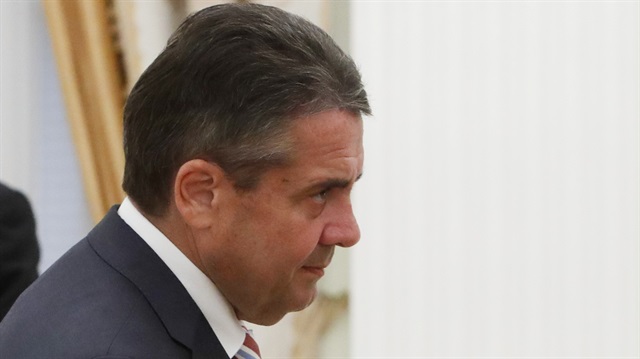

German Foreign Minister Sigmar Gabriel
Gabriel says Ankara is right in criticising Berlin for not doing enough to fight propaganda of terror group in Germany
Foreign Minister Sigmar Gabriel has admitted Germany's failures in combatting propaganda activities of the PKK terror group in his country.
“I think Turkey is right when it warns us and says we should not allow the PKK to carry out propaganda activities in public,” Gabriel told reporters in a news conference at the Foreign Ministry on Friday.
“I also think that it is unacceptable to ban public appearances of Turkish politicians, but at the same time [we] allow posters of Ocalan,” he said, referring to rallies of PKK followers in Germany, in which they use flags of the terrorist group and its so-called ringleader, Abdullah Ocalan.
Germany outlawed the PKK in 1993, but authorities have been reluctant to take strong measures against the propaganda, funding and recruitment activities of the group, which is also listed as a terrorist organization by the EU and the U.S.
Berlin’s reluctance in combatting PKK activities in the country has been the source of major friction between Turkey and Germany, and the issue was recently raised by President Recep Tayyip Erdogan during his meeting with Gabriel in Ankara early this month.
The top German diplomat said on Friday the PKK was not only a threat for Turkey, but also Germany.
“The PKK was banned in our country in the early 90s, not only for what it did in Turkey, but also due to its involvement in extortion, drug trafficking, arms trade in our country; [and] due to the threat for citizens who came from Turkey to Germany,” he said.
The PKK has more than 14,000 followers in Germany, and raised more than €13 million ($14.3 million) in 2015, according to reports by the German domestic intelligence agency, the BfV.
German courts opened more than 4,000 cases against PKK suspects since 1993, but German authorities often turned down extradition demands by Ankara.
Gabriel argued that German government have no influence on the decisions of independent courts and urged the Turkish side to send legally-sound evidence to their German counterparts.
#Gabriel
#Germany
#PKK
#propaganda
#terrorism
#Turkey

